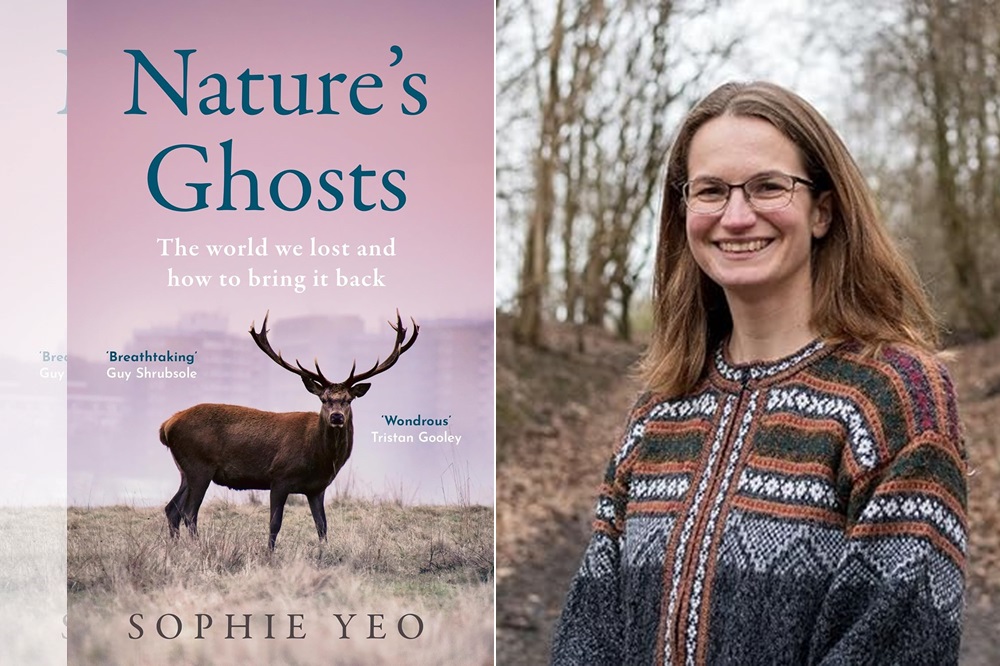On Being a Writer from Wales: Sophie Yeo

Sophie Yeo
I didn’t plan to include Wales in my book, any more than I planned to include any location. Nature’s Ghosts is about environmental history, and how knowledge of the past can inform nature conservation today.
My research involved following threads of science and experience and seeing where they ended up – theoretically and geographically.
One of these threads was farming. The hillsides of Wales have featured in many an environmental diatribe over the years – not least in George Monbiot’s Feral, which introduced the term ‘sheepwrecked’ to the world.
But I wasn’t interested in pasture or livestock on this occasion. Rather, I was interested in a small patch of land on the Gower Peninsula, owned and managed by the National Trust, known as the Vile.
Restored
Based upon archaeological findings, the organisation has restored the tip of the peninsula to how it would have looked during the Middle Ages, when peasants farmed thin strips of land, divided up by mounds of earth known as baulks.
The system has vanished now, but at the Vile you can imagine how it might have looked.
[mid-content-banner}Defining memories
I was pleased to feature the Gower Peninsula in my book. I am from Cardiff. My parents moved away when I was young, but we still returned regularly to see family and friends. These trips would inevitably include trips to Gower.
Afternoons at Rhossili Bay, followed by ice-cream at Joe’s, are among the defining memories of my childhood. We did eventually move back to Cardiff, when I was 15, although without the holiday mindset trips to the coast were less frequent.
Today I live in Newcastle, but my mum still lives in Penarth. It was during one of my trips back home that I asked her if she would drive me to the Vile – hoping that she would treat me to an ice-cream on the way back, of course.
As I sat in the passenger seat, I felt myself going back in time in more ways than one. I was travelling both 20 and 200 years into the past.
Disguise
As a journalist, reporting can often feel impersonal. It is easier that way. It allows you to assume a disguise, giving you a confidence you don’t feel.
While writing Nature’s Ghosts, I also travelled to Finland, Scotland and Norfolk, to meet conservationists there. During these trips, I felt professional. I was there as a writer. I had a job to do.
At the Vile, the work felt different. I couldn’t disassociate from the real me. I felt less like a professional, more like a child. I felt at home.
For someone who has spent barely more than a few years in a single city, this is not something I am used to feeling.
Though my time in South Wales may be sporadic – certainly less frequent than I would like – these landscapes will always be part of me. I only wish that the connection was deeper.
I had arranged to meet up with Mark Hipkin, the National Trust ranger for the Vile. He led me up and down the strips, explaining how the organisation had replaced the intensive management of recent years with the gentler husbandry of older times.
Natural abundance
The transition had proven magnificent for wildlife: whitethroats sang from the thistles and weasels scurried across the path.
Conservation, particularly on farmland, is often seen as being in opposition to culture. But the Vile told a different story.
Natural abundance was the heritage of this place: one chapter of a story reaching hundreds of years backwards in time.
The landscape of the Vile changes through the seasons, which is my way of saying, it was rainy and drab at the time of my visit.
Each summer, however, the strips explode with colour as the flowers enter full bloom. I hope to make it back there soon – perhaps this summer – to see this display, this time with my toddler in tow.
She is 18 months old, just starting to talk, and her Geordie accent is beginning to show; I am hoping there is time to slip a hint of Welsh in there, too.
Nature’s Ghosts by Sophie Yeo is published by Harper North and is available from all good bookshops.
Support our Nation today
For the price of a cup of coffee a month you can help us create an independent, not-for-profit, national news service for the people of Wales, by the people of Wales.





